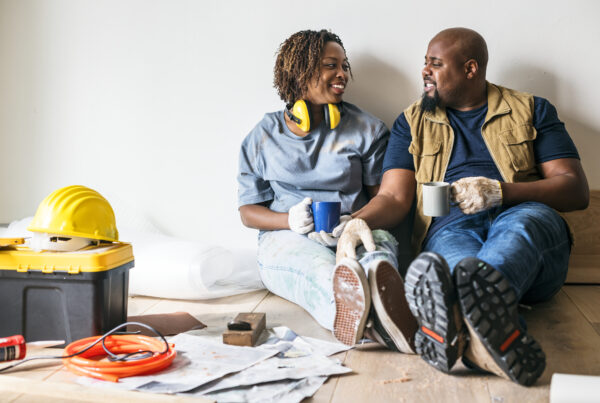Building a new home can be stressful as it comes with its challenges. But building a house can be incredibly rewarding as you bring your home’s vision to life literally from the ground up.
Being aware of common construction challenges can help future homeowners prepare for the unexpected. With the average new home in the U.S. costing about $283,000 to build (excluding the cost of land), it’s important to be aware of common home construction challenges to avoid them and to prepare for what’s to come in the process.
Understanding common new construction challenges
No doubt, challenges are expected with any new construction project. Each new home build presents its own set of unique problems. Many problems are out of your control, including challenges with the lot, covenants placed by the land developer such as minimum square footage, mandated construction methods and even weather.
Being aware of theses common challenges can help you prepare for those unexpected circumstances, which impact budget, timelines and more.
- Meeting expectations. Identify your vision, expected budget and projected timeline as you begin your new home construction project and discuss these expectations upfront with your builder. Communicating expectations early during the initial architectural design process can set the tone for the entire project and ensure you are aligned with contractors moving forward.
- Staying on budget. Building a house is a long-term commitment and significant investment. With the cost of new home construction averaging about $100 to $200 per square foot and luxury homes costing upwards of $500 per square foot (or more!), it is critical to understand all areas of risk associated with your project. Recent challenges across all industries due to skyrocketing inflation have impacted building materials and labor within the construction industry, too. Review your budget regularly with your contractor to stay on track throughout the project as there will inevitably be some unexpected expenses as the build progresses.
- Financing your project. New home construction financing can be challenging. Financing the construction and then ultimately mortgage on your new home can be time-consuming and tedious at a time when there are so many other details to handle. Verve offers an all-in-one, single application construction loan to help homeowners cover the cost of the property and construction which is then converted into a traditional home mortgage after construction is complete. Set up time to connect with a Verve team member to learn more about construction financing.
- Keeping a schedule. New home construction doesn’t generally end on the original date you planned. The average new home construction project takes seven to twelve months to complete. Project dates tend to move depending on many circumstances such as bad weather, building issues, availability of materials, subcontractor schedules and more. Be prepared for the timeline to shift (likely more than once) throughout the process.
- Finding the right materials. Ordering materials like countertops, flooring, sinks and hardware can take weeks or even months to receive. These orders can pose significant challenges to timelines, especially if certain materials are out of stock. Ordering materials sooner than later (in case you need to select another option) can help you get into your dream home faster.
- Documentation and permits. There is paperwork required when building a new home such as a building permit within your city or county, land surveys, title searches and more. A building permit, for instance, is one of the first pieces of documentation you’ll need to solidify. It can take time due to various levels of administration within your municipality, however many builders will take care of required permits and licenses necessary during the building process allowing you to check off a step on the list.
Things to know before breaking ground
Even the best laid plans experience delays and unforeseen project revisions, but putting in the extra work before breaking ground will help you get into your new home as quickly as possible.
Here are things to know when building your new home to help keep your project on track.
- Research contractors. There are many home construction builders available, so don’t be afraid to shop around while making this selection for your new dream home. Talk to past customers to learn of their experience with the builder or check online reviews to get feedback. Be sure to choose a builder who is familiar with your style and vision. For instance, if you are looking to build a modern, green home, make sure your builder has experience and is aware of certifications to be sure they can build a home that meets your expectations.
- Design for your future. When building a house, consider features beyond your current lifestyle and into the future. For example, will small children be involved? How much storage will you need in your new home? Is there a quantity of bedrooms you should consider? Your future family’s needs can impact your home and thinking forward can make sure you’ve covered your bases for the years to come.
- Get your hands dirty. Do you have the skills to take on projects in your new home? This can save both time and money if you are skilled enough to do so as you aren’t relying on contractor schedules, and best of all, you’ll likely be saving money, too.
- Invest where it counts. It might be easy to splurge on trendy accents or home décor but consider investing your money where it matters—and where it will last. Things like permanent fixtures in your home will likely be around for a while, so sourcing and spending more money on these items may make more sense.
Building a house can be challenging yet incredibly rewarding as you bring your vision to life from the ground. Being aware of common challenges can help new homeowners create a plan while being aware of unexpected challenges along the way. Meet with a Verve team member today to discuss new home construction financing options or check out our blog for additional Home Life tips that you can use in your own home.






 Federally Insured by NCUA |
Federally Insured by NCUA |  Equal Housing Opportunity |
Equal Housing Opportunity |